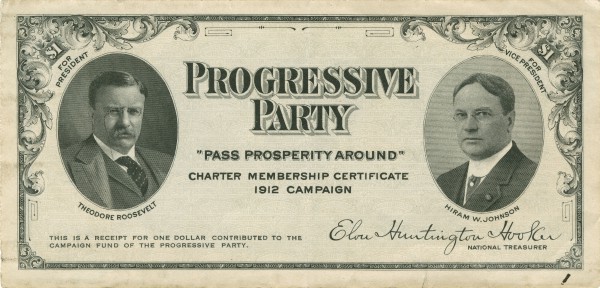Women and the Election of 1912
 A great party has pledged itself to the protection of children, to the care of the aged, to the relief of overworked girls, to the safeguarding of burdened men. Committed to these humane undertakings, it is inevitable that such a party should appeal to women, should seek to draw upon the great reservoir of their moral energy so long undesired and unutilized in practical politics -- one the corollary of the other; a program of human welfare, the necessity for women's participation. - Jane Addams, "Jane Addams Tells Why," August 9, 1912.
A great party has pledged itself to the protection of children, to the care of the aged, to the relief of overworked girls, to the safeguarding of burdened men. Committed to these humane undertakings, it is inevitable that such a party should appeal to women, should seek to draw upon the great reservoir of their moral energy so long undesired and unutilized in practical politics -- one the corollary of the other; a program of human welfare, the necessity for women's participation. - Jane Addams, "Jane Addams Tells Why," August 9, 1912.
The presidential election of 1912 was one of the most fascinating in American history as it was the first time that a third-party candidate had a strong chance to win. All three candidates had to respond to a progressive wave sweeping the country. The incumbent was Republican President William Howard Taft and the Democratic challenger was Woodrow Wilson. Former President Theodore Roosevelt split from the Republican party to establish the Progressive Party, and Eugene V. Debs ran as a Socialist. Progressive politics were at the core of the election, with candidates' platforms often more similar than they were different. They all supported the creation of a department of labor, establishing a national post office, and prohibiting corporate campaign contributions. Roosevelt and the Progressives differed from the two main parties by supporting woman suffrage. With many women still unable to vote, the Progressive Party reached out to women to play a key role in the campaign. The election featured a number of "women’s" issues, such as child labor reform, limiting working hours for women, and universal suffrage.
As one of the best-known social reformers in the country, politicians sought Jane Addams' endorsement and assistance. Despite the fact that most suffrage activist tried to remain non-partisan, Addams decided to support the Progressive Party because of its support for women's votes. This step was controversial, and Addams debated her decision with other suffragists who felt that supporting one political party would alienate others.
Addams seconded Theodore Roosevelt’s nomination at the Progressive Party convention, the first time a woman had held this honor. She became a key figure in Roosevelt's campaign, speaking on his behalf in states where woman had the ballot and advocating for men to vote for suffrage in states where it was on the ballot. In the days after her nomination speech, progressives and socialists debated Addams' support for Roosevelt, criticizing him and Addams because of their opposition to his support for a strong miltary and the fact that the Socialist Party platform was better aligned with Addams' beliefs.
Addams was not alone in her political participation. Women of every political party were energized in 1912 and became involved in local, state, and national politics. Each political party formed womens' organizations that supported and promoted their platforms, despite the fact that many of these women were unable to vote. Women became delegates in party primaries, wrote speeches and articles, and campaigned for their chosen candidate. Because of this, Arizona, Kansas, and Oregon passed woman suffrage laws. Though Woodrow Wilson won the presidential election, the Progressive Party won nine seats in the House of Representatives, and was able to press all parties towards a more progressive agenda.
Recommended primary sources:
- Jane Addams, Nominating Speech for Theodore Roosevelt, August 7, 1912.
- Jane Addams, The Progressive Party and Safeguards for Working Girls, August-September, 1912.
- Jane Addams, The Progressive Party and the Disinherited, August-September, 1912.
- Jane Addams, The Progressive Party and the Needs of Children, August-September, 1912.
- Jane Addams, The Progressive Party and the Protection of Immigrants, August-September 1912.
- Jane Addams, Why I Seconded Roosevelt's Nomination, August 17, 1912.
- Jane Addams, The Progressive Party and Social Legislation, September 18, 1912
- Jane Addams, Woman and the Ballot: The Progressive View, October 6, 1912
- Miss Boardman Won't Act, New York Times, August 15, 1912, p. 5:2.
- Wharton Barker, "Progressive Party, Declaration of Principles" April 20, 1912.
- Albert J. Beveridge, "Progressive Party Pamphlet," ca. August 5, 1912.
- Theodore Roosevelt to Jane Addams, August 8, 1912.
Additional resources:
- Presidential Election of 1912: A Resource Guide
- The American Presidency Project
- Theodore Roosevelt Center
- The Progressive Era
- The Square Deal: Theodore Roosevelt and the Themes of Progressive Reform
- Woodrow Wilson Papers, Library of Congress
Suggested subject searches:
Addams, Jane, and Progressive Party
Addams, Jane, views on Progressivism
People, organizations and events:
- Beveridge, Albert J.
- Kellor, Frances
- Progressive Party
- Progressive National Service
- Roosevelt, Theodore
- US Presidential Election of 1912
Photo credits
Political flyer for the Progressive Party. 1912. Unknown artist. Flyer. Collection of Oakland Museum of California.
